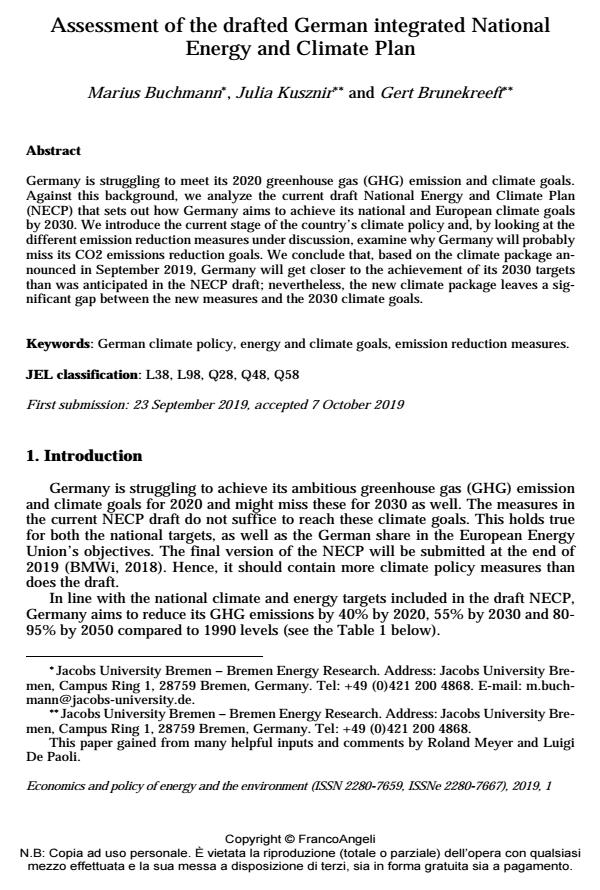Assessment of the drafted German integrated National Energy and Climate Plan
Journal title ECONOMICS AND POLICY OF ENERGY AND THE ENVIRONMENT
Author/s Marius Buchmann , Julia Kusznir , Gert Brunekreeft
Publishing Year 2019 Issue 2019/1
Language English Pages 12 P. 85-96 File size 98 KB
DOI 10.3280/EFE2019-001006
DOI is like a bar code for intellectual property: to have more infomation
click here
Below, you can see the article first page
If you want to buy this article in PDF format, you can do it, following the instructions to buy download credits

FrancoAngeli is member of Publishers International Linking Association, Inc (PILA), a not-for-profit association which run the CrossRef service enabling links to and from online scholarly content.
Germany is struggling to meet its 2020 greenhouse gas (GHG) emission and climate goals. Against this background, we analyze the current draft National Energy and Climate Plan (NECP) that sets out how Germany aims to achieve its national and European climate goals by 2030. We introduce the current stage of the country’s climate policy and, by looking at the different emission reduction measures under discussion, examine why Germany will probably miss its CO2 emissions reduction goals. We conclude that, based on the climate package announced in September 2019, Germany will get closer to the achievement of its 2030 targets than was anticipated in the NECP draft; nevertheless, the new climate package leaves a significant gap between the new measures and the 2030 climate goals.
Keywords: German climate policy, energy and climate goals, emission reduction measures.
Jel codes: L38, L98, Q28, Q48, Q58
- Impact of Key Drivers on Energy Intensity and GHG Emissions in Manufacturing in the Baltic States Vaclovas Miskinis, Arvydas Galinis, Viktorija Bobinaite, Inga Konstantinaviciute, Eimantas Neniskis, in Sustainability /2023 pp.3330
DOI: 10.3390/su15043330 - European Roadmaps to Achieving 2030 Renewable Energy Targets Giacomo Di Foggia, Massimo Beccarello, in SSRN Electronic Journal /2024
DOI: 10.2139/ssrn.4770915 - A Global Perspective on Renewable Energy Implementation: Commitment Requires Action Giacomo Di Foggia, Massimo Beccarello, Bakary Jammeh, in Energies /2024 pp.5058
DOI: 10.3390/en17205058 - European roadmaps to achieving 2030 renewable energy targets Giacomo Di Foggia, Massimo Beccarello, in Utilities Policy 101729/2024 pp.101729
DOI: 10.1016/j.jup.2024.101729 - Review of Energy and Climate Plans of Baltic States: The Contribution of Renewables for Energy Production in Households Dalia Streimikiene, Grigorios L. Kyriakopoulos, Gintare Stankuniene, in Energies /2022 pp.7728
DOI: 10.3390/en15207728
Marius Buchmann , Julia Kusznir , Gert Brunekreeft, Assessment of the drafted German integrated National Energy and Climate Plan in "ECONOMICS AND POLICY OF ENERGY AND THE ENVIRONMENT" 1/2019, pp 85-96, DOI: 10.3280/EFE2019-001006